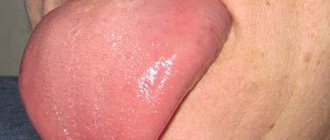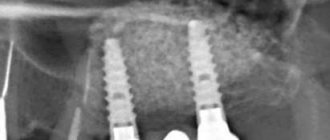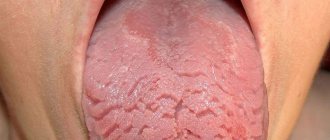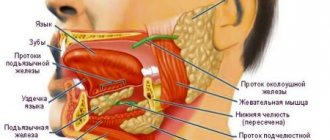4143
If you watch small children, you will see how some of them often stick out their tongues. Most of the time it's just for fun or exploring your body.
But sometimes such a prank is an indicator of an abnormality in the development of the language, namely macroglossia. Unfortunately, this disease occurs not only in children, but also in adults. And its untimely treatment leads to serious consequences.
In today’s article we will find out why a person’s tongue can be enlarged, what diagnosis is made in this case, and how to get rid of this disease.
Forms
Photo: macroglossia
According to the different nature of the causes of this disease, medicine distinguishes its two forms: local or local, and generalized. Local (local) macroglossia occurs as a result of improper development of the circulatory system, which has no connection with general diseases of the body that lead to hypertrophy of the tongue.
Most often, this form occurs due to vascular formations of the tongue - lymphangioma or hemlymphangioma. The main location is the front part, but sometimes it is also observed on the root. Local macroglossia is typical for children of the first years of life
.
When additional infections and diseases occur, the tongue rapidly enlarges.
The generalized form of macroglossia occurs due to concomitant pathologies of the whole organism. For example, hemihypertrophy, hypothyroidism, Beckwith-Wiedemann syndrome. Characterized by enlargement of the tongue on one or both sides.
Causes
For acquired and congenital macroglossia, the causes differ and are conventionally divided into two groups.
Congenital macroglossia
- benign tumor-type formation. Occurs as a result of a violation of the proper development of the fetus;
- hypertrophy of the muscular apparatus of the tongue, accompanied by idiopathic diseases;
- exposure to harmful factors on the pregnant woman’s body: severe infectious diseases, radiation, regular alcohol intoxication. In this case, the fetus experiences active growth of only one half of the face;
- the formation of a cyst or cavity during the formation of the muscular apparatus of the tongue.
Acquired macroglossia
- improper functioning of the thyroid gland, which leads to insufficient production of its hormones. This in turn causes physical and mental retardation;
- excessive production of a hormone responsible for human growth. Observed in older people;
- complete loss of lower jaw teeth;
- amyloidosis. Excessive accumulation of carbohydrate and protein compounds;
- malignant tumors;
- syphilis;
- tuberculosis;
- the presence of purulent inflammation;
- profuse intramuscular hemorrhage;
- pathologies caused by fungal infections (candidiasis);
- disruption of lymph flow and blood flow;
- allergic reaction
- catarrhal glossitis.
Let's find out what causes the yellow coating on a person's tongue.
In this article, read reviews about ultrasonic teeth cleaning.
Here: https://www.vash-dentist.ru/lechenie/yazyik-l/prichinyi-poyavleniya-naleta-korichnevogo-tsveta.html - let’s figure out why a brown coating may appear on the tongue.
Complications
Already in the first stages of its progression, the disease causes its owner a lot of trouble, both physical and psychological.
A neglectful attitude to the situation is fraught with serious problems:
- dysfunction of the gastrointestinal organs , which tend to become chronic in a short time;
- frequent ENT diagnoses , pathogenic infection of the respiratory system;
- risk of asphyxia , which, if assistance is not provided in time, can lead to serious consequences or death;
- disruption of the speech apparatus, up to its complete dysfunction;
- dryness of the oral mucosa in combination with caries manifestations and periodontal tissue diseases.
Technical characteristics of popular models of Oral Bee electric toothbrushes and general instructions for use. In this publication we will talk about how much it costs to insert a tooth.
Follow the link https://dentist-pro.ru/krasota-i-uxod/sredstva/zubnye-shhetki/chto-vybrat-klassicheskuyu-ili-monopuchkovuyu.html if you are interested in a photo of a monotuft toothbrush and its detailed description.
Symptoms
In everyday life, experts come across such concepts as false and true macroglossia. The fact is that incorrect development of the jaw arch is often mistaken for an increase in the muscular system of the tongue.
.
With a narrow or receding jaw, a tongue of standard length and width appears more voluminous. In such cases, macroglossia is false. In the case when the tongue actually has an enlargement that exceeds its normal size by one and a half times, then this is true macroglossia.
In newborns
The success of treating this disease depends on timely detection of symptoms. The congenital form must be detected in a newborn child, without waiting for him to grow up. This will avoid the chronic course of the pathology.
Certain symptoms have been identified for this:
- visible enlargement of the tongue with a protrusion outside the oral cavity;
- the surface of the tongue is dried out and becomes “varnished”;
- labored breathing;
- refusal to eat, as the enlarged root of the tongue blocks the larynx;
- regular attacks of asphyxia;
- pronounced surface roughness;
- papillary hypertrophy;
- slightly open mouth position (all or most of the time);
- increased salivation;
- body temperature rises, since in the case of macroglossia additional infections are often associated;
- There is a deterioration in the general condition of the child.
Chronic macroglossia
These symptoms are more related to the severe or chronic form of macroglossia and mainly serve to determine the disease in an adult.
These symptoms include:
- enlargement of the tongue by half its size or more;
- the mouth is constantly in an open position;
- there is copious secretion of saliva;
- the surface of the tongue becomes rough;
- cracks appear that often bleed;
- tongue mobility is almost completely limited;
- on the tongue there are bluish bubbles filled with blood from capillary vessels;
- speech dysfunction;
- regular injury to the mucous membranes and tongue with crowns;
- severe lymphangioma in the lower part of the mouth or neck.
Macroglossia - causes of tongue enlargement and consequences of the anomaly
From time immemorial, language has served as the main indicator of human health. Any changes in its appearance and structure, the appearance of plaque and neoplasms are all direct signals that some pathological processes are occurring in the body. One of the most serious phenomena is considered to be an increase in the size of the main speaking organ. This condition is medically called macroglossia. Further in this material we will talk about what it is, why such an anomaly occurs in adults and children, what methods are used today to treat the pathology.
Consequences
Macroglossia is a phenomenon that brings not only temporary inconvenience, but can also have serious consequences, which are extremely dangerous for the body. First of all, the functioning of the entire respiratory system is disrupted
, which leads to its pathologies.
Delayed treatment to the clinic leads to the development of malocclusion
which can only be corrected through complex orthodontic procedures. Their appointment is possible only if macroglossia is successfully eliminated.
With macroglossia, the installation and use of any orthodontic systems is impossible.
In addition to the listed consequences, deformation of dental and periodontal tissues occurs. The functioning of the digestive system and alimentary tract is also
.
Gastritis, ulcers, colitis appear
etc.
Partial speech impairment
. This is especially reflected in the pronunciation of whistling and hissing sounds.
If left untreated, the disease progresses and is constantly accompanied by pain, as regular inflammation of the mucous membrane and tongue biting occurs. At a minimum, this disease causes problems of a social nature, and appearance is to blame.
What could be the consequences if treatment is not started on time?
Macroglossia is not just an aesthetic defect, but a serious pathological phenomenon that can lead to dangerous consequences. Among the possible negative developments, dental experts highlight the following phenomena:
- serious disruptions in the functioning of the lungs, frequent cases of asphyxia, which in the worst circumstances can even lead to death,
- the formation of malocclusion in children, which also negatively affects the condition of the body as a whole,
- disturbances in the functioning of the gastrointestinal tract, since with such a pathology it is quite difficult to chew food thoroughly,
- deformation of teeth and soft tissues of the oral cavity,
- speech dysfunction and problems with the patient’s social adaptation.
Frequent biting of the organ, the appearance of cracks and microtraumas cannot be avoided - all this causes serious inconvenience and can provoke the development of an infectious process. It is important to respond to the problem in a timely manner in order to prevent possible complications.
- Matveev, PC Clinical system for diagnosing macroglossia, 2013.
Diagnostics
Macroglossia can be diagnosed already during fetal development
. Currently, medicine has developed standard sizes for each fetal organ at any stage of pregnancy. These standards include the length and width of the tongue.
However, experts make a final conclusion only when studying the profile projection of the fetus with an interval of 1–2 months. If at the same time a tongue protruding beyond the oral cavity is detected each time, then a diagnosis of macroglossia is made.
Most often, a diagnosis can be made only closer to 30 weeks of pregnancy, but in rare cases this pathology can be detected as early as 19 weeks.
After birth and throughout life, to diagnose macroglossia, you need to contact an otolaryngologist, who will prescribe a full examination, including clinical tests and instrumental methods.
After identifying the cause of the disease, consultation with other specialists may be necessary: endocrinologist, infectious disease specialist, oncologist, etc. After which a treatment plan is drawn up.
Prevention
As preventive measures that can prevent the occurrence of the disease or avoid its relapse, the patient is recommended to:
- for vascular abnormalities, undergo regular therapeutic treatment;
- monitor the condition of the oral cavity, prevent the occurrence of serious dental diagnoses, visit a specialist at least once every 6 months;
- beware of infectious diseases;
- do not smoke or drink alcohol;
- Eat a quality and balanced diet, giving preference to vitamins and minerals.
Treatment
Three methods are used to treat macroglossia:
Drug therapy
In case of pathology caused by general diseases, treatment is always aimed at eliminating the cause. For this purpose, a set of drugs is selected, and means are prescribed for regular treatment of the oral cavity and tongue.
Surgery
It is determined individually, in accordance with the diagnosis and the causes of the pathology. To do this, various surgical methods are used, which have their differences:
- Surgical treatment in newborns consists of wedge-shaped or flap resection of the pathological area of the tongue. After this, U-shaped sutures are applied;
- for vascular pathologies, sclerotherapy or phlebectomy is performed. During sclerotherapy, a special drug is injected into the vessels to promote their restoration. During phlebectomy, the affected vessels are excised;
- During the period of active growth of the child, the method of ligating the artery of the tongue is used. This leads to a decrease in growth rates and its gradual restoration in size;
- if there is a shortened frenulum of the tongue, it is cut off from the inner surface.
The procedure for trimming the frenulum of the tongue in children is carried out using a surgical spatula with an anatomical notch, which is used to lift the tongue until the frenulum is fully tensioned. After that, excision is carried out using surgical scissors or a scalpel to a distance of up to 1.5 cm. If the procedure is carried out correctly, blood loss is eliminated, so sutures are not required.
Let's find out why a white coating forms on the tongue, is it dangerous?
This publication describes ways to treat mouth ulcers.
Here: https://www.vash-dentist.ru/lechenie/zubyi/dentofobiya-stomatofobiya-raznovidnosti-i-sposobyi.html - you can find out how to deal with dentophobia.
Complex method
Most often used for tumor formations. Treatment with this method includes:
- excision of the affected part;
- application of the sclerotherapy method;
- drug therapy, which is aimed not only at eliminating the cause, but also at preventing relapse;
- vascular embolization;
- hormonal therapy.
The complex method includes drug therapy and surgery and is the most effective for successfully combating this pathology.
Characteristic symptoms
In order to respond to a problem in a timely manner, you need to know what signs to recognize it. Here are the main symptoms of macroglossia:
- enlarged tongue, to the point where the organ no longer fits in the oral cavity,
- dryness of mucous membranes,
- difficulty breathing, asthma attacks,
- difficulty chewing and swallowing food,
- lumpy surface of the tongue
- enlarged taste buds
- excessive salivation,
- inability to close your mouth normally,
- formation of bleeding cracks on the back,
- diction problems,
- often an increase in temperature, the addition of common infections.
With this pathology, it is impossible to close the mouth normally.
Gradually, the patient’s condition worsens, the bite is deformed, and ulcers appear on the back of the organ. The area around the mouth becomes inflamed and irritation occurs.
Indications for surgery
Surgical intervention is not indicated in all cases of macroglossia development. Similar methods are used in the presence of certain factors:
- pathological respiratory dysfunction;
- complete disorder of the eating process;
- improper performance of speech function;
- for problems of an aesthetic nature;
- uncontrolled salivation;
- formed open bite. Only if it is impossible to correct an open bite using orthodontic systems.
Always remember that macroglossia is not just an unpleasant phenomenon that spoils a person’s appearance and causes pain. This is a pathology that leads to serious problems and irreversible consequences. Therefore, treatment must be timely and completed in full.
In conclusion, the video “Surgical treatment of macroglossia”:
If you find an error, please select a piece of text and press Ctrl+Enter.
Tags macroglossia language
Did you like the article? stay tuned
Previous article
Osteomyelitis of the jaw: types and methods of treatment
Next article
Plates for teeth straightening: types and nuances of application









